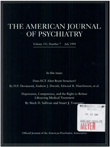Coping with the threat of AIDS: the role of social support
Abstract
OBJECTIVE: There has been relatively little clinical research on how asymptomatic HIV-positive men cope with the threat of AIDS. The present study was intended to 1) describe the coping strategies used by asymptomatic HIV-positive homosexual men, 2) examine the relationship of coping to dysphoria and self-esteem, and 3) explore how race and social support correlate with coping. METHOD: The study group was composed of 52 asymptomatic HIV-positive homosexual men. A group of 53 HIV-negative homosexual men was used for descriptive comparison. Data on coping, social support, dysphoria, and self-esteem came from self- report measures; depression was also determined by interviews with the Hamilton Rating Scale for Depression. RESULTS: The authors found that 1) subjects primarily coped with the threat of AIDS by adopting a fighting spirit, reframing stress to maximize personal growth, planning a course of action, and seeking social support; 2) more helpless coping, less fighting spirit, and less personal growth were related to dysphoria and poor self-esteem, whereas denial was related to more depression, anger, and helpless coping; 3) satisfaction with one's social support networks and participation in the AIDS community were related to more healthy coping strategies (e.g., fighting spirit, personal growth); and 4) black subjects expressed more denial, more helplessness, and less social support. CONCLUSIONS: These results suggest that health professionals should encourage more adaptive coping strategies, help patients use existing sources of positive social support, and assist patients, particularly black patients, in finding community support networks.
Access content
To read the fulltext, please use one of the options below to sign in or purchase access.- Personal login
- Institutional Login
- Sign in via OpenAthens
- Register for access
-
Please login/register if you wish to pair your device and check access availability.
Not a subscriber?
PsychiatryOnline subscription options offer access to the DSM-5 library, books, journals, CME, and patient resources. This all-in-one virtual library provides psychiatrists and mental health professionals with key resources for diagnosis, treatment, research, and professional development.
Need more help? PsychiatryOnline Customer Service may be reached by emailing [email protected] or by calling 800-368-5777 (in the U.S.) or 703-907-7322 (outside the U.S.).



